U.S. History Timeline: 1800–1849


As it heads into the 19th century, the United States is a country that is still only 24 years old, the Treat of Paris was signed in 1783.
Ahead lies a century of remarkable growth, changes, and conflict as the United States of America evolve into a nation. It achieves this despite significant challenges posed by internal divisions and external threats from the European powers in the Americas.
The United States in the 1800s
The United States in the 1800s is a nation-leading a precarious existence. Created by the 1776 Declaration of Independence and ratified by the Treaty of Paris, the United States could have easily collapsed during these formative years.
The 1800s provides a timeline of how these early challenges were faced and overcome. How a sense of identity and unity was created through the adversity of internal divisions and external threats from colonial and neighboring powers.
What Five Major Events Happened in the Early 1800s?
The five major events that take place during the early 1800s can be viewed as:
- 1800: Establishment of Washington, DC as U.S. capital.
- 1803: Louisiana Purchase deal doubles the size of the U.S.
- 1814: Patriotic spirit captured by "Star Spangled Banner".
- 1823: Monroe Doctrine announces the U.S. as a global player.
- 1828: Baltimore-Ohio railroad starts the transport revolution.
These are the pivotal events that helped to define the territory, politics, and character of modern America.
US History Timeline: 1800-1849
The first half of the 19th century is a time of nation-building with Washington, DC taking root as the nation’s capital. During this period, the United States significantly increases the size of its territories and starts building the transport infrastructure needed for a modern nation.
It was also a period where divisions emerge over slavery that will result in a civil war between confederates and union supporters during the second half of the century. Keep going to read about major events in U.S. History from 1800 to 1849, including the War of 1812, the Monroe Doctrine, the siege of the Alamo, and more.
U.S. History Timeline: 1800-1849 (A New Nation)
1800
June 15
- The U.S. capital is moved from Philadelphia to Washington, DC.
Philadelphia had been acting as a temporary capital for the previous ten years while Washington, DC was constructed. The new capital was designed by French-American military engineer Pierre Charles L'Enfant. The buildings he designed include the Library of Congress to serve as a research library for the United States of America. The deadline for the new capital was set by U.S. President John Adams who declared that government offices be “be opened in the City of Washington for the dispatch of business by the fifteenth of June."
November 17
- U.S. Congress meets in Washington, DC, for the first time.
The U.S. Congress had adjourned on May 14, 1800, to allow time for the government to relocate to the newly built capital of Washington, D.C. Following a long recess, the congress assembled in a partially constructed Capital Building on November 17. The meeting took place in the North Wing with it being many years before the building is completed.
- Gabriel Prosser, an enslaved African American blacksmith, organizes a slave revolt intending to march on Richmond, Virginia.
The conspiracy is uncovered, and Prosser and a number of the rebels are hanged. Virginia's slave laws are consequently tightened.
1801
March 4
- Thomas Jefferson is inaugurated as the third president in Washington, DC.
Thomas Jefferson defeated incumbent president John Adams to become the first U.S. President to be inaugurated in Washington, D.C. Having failed to win a majority, Jefferson’s victory was down to a vote in the House of Representatives with him winning on the 36th ballot.
1803
February 24
- Marbury v. Madison: Landmark Supreme Court decision. A landmark U.S. Supreme Court case that greatly expands the power of the Court by establishing its right to declare acts of Congress unconstitutional. It helped to establish that the U.S. Constitution is actual law and more than just a statement of ideas. The case originated in 1801 as a political dispute between outgoing President John Adams and his replacement Thomas Jefferson.
Treaty signed May 2
- Louisiana Purchase: Treaty Signed.
United States agrees to pay France $15 million for the Louisiana Territory, which extends west from the Mississippi River to the Rocky Mountains and comprises about 830,000 sq mi. As a result, the U.S. nearly doubles in size. Despite the sale, the French First Republic only controlled area of the land which was inhabited by Native Americans.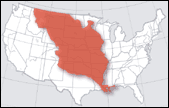 Louisiana Purchase
Louisiana Purchase
1804
May 14
- Lewis and Clark explore the Northwest.
Following the United States doubling its territory with the Louisiana Purchase, an expedition is launched to explore the new land. President Thomas Jefferson commissions private secretary Meriwether Lewis and military captain William Clark to lead a team of 33 men on a ‘Corps of Discovery’. Setting out from St. Louis, Mo., the expedition to explore the West and find a route to the Pacific Ocean lasts more than two years.
1805
March 4
- Jefferson's second inauguration.
Thomas Jefferson is elected to serve his second term as U.S. President following a landslide election victory. Jefferson rode to the Capital on horseback to deliver his inauguration speech which was critical of press attacks on him but defended the freedom of the press.
November 15
- Lewis and Clark reach the Pacific Ocean.
The expedition to explore the U.S. territories acquired from France reaches the Pacific Ocean a year and a half after embarking from St. Louis, Mo. Led by Meriwether Lewis and William Clark, the discovery marks the completion of the goal set by President Thomas Jefferson for them to find "the most direct and practicable water communication across this continent, for the purposes of commerce."
1809
March 4
- James Madison is inaugurated as the fourth president.
James Madison is sworn in as the fourth President of the United States after a decisive victory over Charles Cotesworth Pinckney in the 1808 election. He uses his inauguration speech to call for the United States to remain neutral and avoid wars, saying: “It has been the true glory of the United States to cultivate peace by observing justice."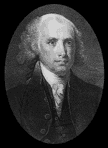 James Madison
James Madison
1812 –
1814
June 18, 1812
- War of 1812: U.S. declares war on Great Britain.
The United States' declaration of war against the British follows long-standing tensions over territories, trade, and maritime rights. It marks the emergence of the U.S. as a military force on the world stage with much of the conflict focused on the British Empire’s territory in Canada. The war ended with the Treaty of Ghent in 1814.
March 4, 1813
- Madison's second inauguration.
James Madison is elected to serve his second term as President of the United States. He defeats a challenge from DeWitt Clinton who had opposed the recently declared war with Britain. President James Madison used his second inauguration speech to rally support for the war effort.
Aug. 24, 1814
- British capture Washington, DC.
British troops march into Washington, DC, and set fire to the White House and Capitol buildings. The attack occurs during the war with Britain over maritime and trading rights. A torrential rainstorm prevents the Capitol from being completely destroyed but it takes five of renovation before the Senate is able to return to the building.
Sept. 13–14, 1814
- Francis Scott Key writes Star-Spangled Banner.
Lawyer Francis Scott Key is moved to write a poem after witnessing British forces bombarding Fort McHenry in Baltimore Harbour. This poem is later put to the tune of an English drinking song to become, "The Star-Spangled Banner". The popularity of the patriotic song leads to it becoming the national anthem in 1931.
Dec. 24, 1814
- Treaty of Ghent: Ends war with Britain.
Signed by the United States and British officials in the Belgian city of Ghent, this brought an end to the war between the two nations. The agreement restored the agreements that were in place between the two parties before the war was declared in 1812. It brings an end to any major hostilities between the United States and the United Kingdom.
1817
March 4
- James Monroe inaugurated as the fifth president.
Statesman and diplomat James Monroe was sworn in as the fifth president of the United States. He is elected after winning the 1816 presidential election against Rufus King by a large majority. He uses his first inaugural speech to call for a build-up of military powers and for more unity between the rival factions of Republicans and Federalists.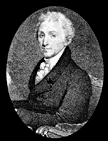 James Monroe
James Monroe
1819
February 22
- Spain agrees to cede Florida to the United States.
A treaty with Spain is agreed that cedes Florida to the United States to resolve previous border disputes between the two countries. Known as the Adams-Onis Treaty or the Florida Treaty, Spain ceded Florida in return for settling a border dispute along the Sabine River in Spanish Texas. The legitimacy of the treaty was challenged by later agreements between Spain and Mexico.
- McCulloch v. Maryland: Landmark Supreme Court decision.
A legal case lasting two years is resolved with the Supreme Court upholding the right of Congress to establish a national bank. The power had previously been implied but not specifically stated by the Constitution. It’s a ruling that establishes the supremacy of the American federal government over the states.
1820
March 3
- Missouri Compromise: Attempt to resolve slavery tensions.
In an effort to maintain the balance between free and slave states, Maine (formerly part of Massachusetts) was admitted as a free state so that Missouri can be admitted as a slave state; except for Missouri, slavery is prohibited in the Louisiana Purchase lands north of latitude 36°30'. The law is an attempt to tackle rising tensions over the issue of slavery. The law remains in place until it’s repealed in 1854.
1821
March 5
- Monroe's second inauguration.
James Monroe returned to serve his second term as president of the United States. He is elected unopposed in 1820 after the Federalist Party were unable to put forward a presidential candidate due to the party’s declining popularity.
Dec. 19, 1777 – June 19, 1778
- Battle-weary and destitute Continental army spends brutally cold winter and following spring at Valley Forge, Pa.
Oct. 19, 1781
- British general Charles Cornwallis surrenders to Gen. George Washington at Yorktown, Va.
Sept. 3, 1783
- Great Britain formally acknowledges American independence in the Treaty of Paris, which officially brings the war to a close.
1822
- Denmark Vesey: Leader of a slave revolt executed.
Denmark Vesey, an enslaved African American carpenter who had purchased his freedom, plans a slave revolt with the intent to lay siege on Charleston, South Carolina. The plot is discovered with Vesey and 34 co-conspirators hanged. Vessey had been able to purchase his freedom after winning $600 in a street lottery.
1823
December 2
- Monroe Doctrine: Warning message to European nations.
In his annual address to Congress, President Monroe declares that the American continents are henceforth off-limits for further colonization by European powers. It warned that any outside intervention in the Americas would be regarded as a potentially hostile act. The doctrine forms the basic approach of American foreign policy during the 19th and 20th centuries.
Nov. 15
- Continental Congress adopts the Articles of Confederation, the first U.S. constitution.
1824
March 2
- Gibbons v. Ogden: Landmark Supreme Court decision.
The outcome of this U.S. Supreme Court case established a general principle that states cannot interfere with the power of Congress on commercial matters. The ruling resulted from a dispute among steamboat operators and helped to empower the federal government to legislate on commercial matters.
1825
March 4
- John Quincy Adams is inaugurated as the sixth president.
Diplomat and lawyer John Quincy Adams is appointed as the sixth President of the United States. The son of the former president, John Adams, he faces opposition only from members of his own Democratic-Republican Party due to the decline of the rival Federalist party.
- Erie Canal, linking the Hudson River to Lake Erie, is opened for traffic.
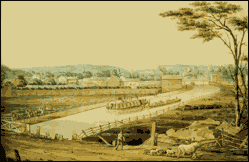 View of Erie Canal by John William Hill, 1829
View of Erie Canal by John William Hill, 1829
1828
July 4
- Construction of Baltimore-Ohio Railroad.
The first stone is laid to commence construction of the Baltimore and Ohio Railroad (B&O), the first public railroad in the U.S. Funded by the B&O Railroad Company, the first section of the line opens in 1830. It was not until 1852 that the railroad finally reaches the project destination of Ohio.
March 4
- U.S. Constitution goes into effect, having been ratified by nine states.
March 4
- U.S. Congress meets for the first time at Federal Hall in New York City.
April 30
- Washington is inaugurated as president at Federal Hall in New York City.
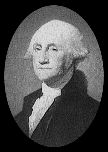 George Washington
George Washington
1829
March 4
- Andrew Jackson inaugurated as seventh president.
Andrew Jackson takes the oath of office to become the seventh President of the United States. A former general who took part in the War of 1812, he wins an overwhelming victory in the 1828 election. His inaugural speech includes a commitment to ensure the fair treatment of Native Americans.
- The court, made up of one chief justice and five associate justices, hears its first case in 1792.
- The nation's first census shows that the population has climbed to nearly 4 million.
1830
May 28
- Signing of the Indian Removal Act.
President Andrew Jackson signs the Indian Removal Act, which authorizes the forced removal of Native Americans living in the eastern part of the country to lands west of the Mississippi River. By the late 1830s, the Jackson administration has relocated nearly 50,000 Native Americans. The Cherokee were among the tribes to unsuccessfully challenge the legality of the act.
- By the late 1830s the Jackson administration has relocated nearly 50,000 Native Americans.
1831
- Nat Turner leads slave uprising.
Enslaved African American preacher, Nat Turner, leads the most significant slave uprising in American history. He and his band of around 80 followers launch a bloody, day-long rebellion in Southampton County, Virginia. The militia quells the rebellion, and Turner is eventually hanged. As a consequence, Virginia instituted much stricter slave laws.
- Anti-slavery "Liberator" newspaper is launched.
William Lloyd Garrison begins publishing the Liberator, a weekly paper that advocates the complete abolition of slavery. He becomes one of the most famous figures in the abolitionist movement. The Liberator continued to publish for 30 years with the final edition published in 1865.
- Eli Whitney's invention of the cotton gin greatly increases the demand for slave labor.
1833
March 4
- Jackson's second inauguration.
Andrew Jackson is re-elected as President of the United States. He returns as a Democratic Party representative after defeating Henry Clay of the National Republican Party in the 1832 election.
1836
March 1
- Siege of the Alamo.
The Alamo takes place during the Texas Revolution with Mexican troops laying siege to Texas rebels camped out at the Alamo Mission near San Antonio de Bexar. After 13 days, the Mexicans capture the fort and kill around 200 Texan defenders that include politician and soldier Davy Crockett.
- Texas declares its independence from Mexico.
The Texas Declaration of Independence was signed following the Texas Revolution. It declared Texas as being independent from Mexico, creating the Republic of Texas.
February 24 – March 6
- Texans defeat Mexicans at San Jacinto.
Having declared independence, the Texan rebels continue to contest the territory with Mexican troops. The final and decisive battle takes place along the San Jacinto River with the Texan Army defeating the Mexican forces. It leads to the Mexican troops retreating from the area and ratifying the Independence of the newly formed republic.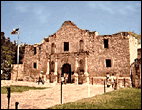 The Alamo
The Alamo
1837
March 4
- Martin Van Buren is inaugurated as the eighth president.
The son of a New York tavern keeper, Martin Van Buren is elected as the eighth President of the United States. A founder of the Democratic Party who was nicknamed the ‘Little Magician’, his term coincided with the Panic of 1837 financial crisis.
1838
- Using powers granted by the Indian Removal Act, more than 15,000 Cherokee Indians are forced to march from Georgia to Indian Territory in present-day Oklahoma.
Approximately 4,000 die from starvation and disease as they are forcibly moved along a route that becomes known as the “Trail of Tears”.
1841
March 4
- William Henry Harrison is inaugurated as the ninth president.
Military officer and politician William Henry Harrison is sworn in as the ninth President of the United States. He dies just 31 days later, making this the shortest term served by an American president. He is also the first president to die while in office. with his vice president, John Tyler, replacing him.
April 4
- He dies one month later and is succeeded in office by his vice president, John Tyler.
1845
March 1
- U.S. annexes Texas.
The Republic of Texas is annexed into the United States, making it the 28th state of the Union. The Republic of Texas had previously declared independence from Mexico following a revolt by rebel settlers. The decision to accept Texas was controversial due to it being a slave state.
March 4
- James Polk inaugurated as the 11th president.
Democratic Party representatives James K. Polk is sworn in as the 11th President of the United States. He defeats Whig politician Henry Clay in the 1844 election. His inaugural speech is the first to be covered by telegram with illustrations appearing the next day in the London press.
July 1
- "Manifest destiny" embodies U.S. foreign policy.
The term “manifest destiny” appears for the first time in a magazine article by John L. O'Sullivan. Published in the United States Magazine and Democratic Review, it expresses the belief held by many white Americans that the United States is destined to expand across the continent. The phrase becomes a political slogan and rallying call that promotes the idea of America having a God-given right to expand its territory.
1846
June 15
- Oregon Treaty ends boundary dispute.
The signing of the Oregon Treaty resolves a dispute between the United States and the United Kingdom over the territory around Oregon. After a negotiated settlement, the agreement fixes the U.S.-Canadian border along the 49th parallel of north latitude and the U.S. acquires the Oregon Territory.
- The Wilmot Proviso, introduced by Democratic representative David Wilmot of Pennsylvania, attempts to ban slavery in territory gained in the Mexican War.
The proviso is blocked by Southerners but continues to enflame the debate over slavery. It is reintroduced the following year but again fails to win approval from the Senate.
1846 –
1848
May 13, 1846
- Mexican War: U.S. declares war on Mexico.
The United States declares war on Mexico, triggering two years of conflict. The roots of the war are ongoing disputes over Texas and its recent annexation into the United States. It triggers the expansion west of the United States, adding states such as California, New Mexico, and Arizona.
Feb. 2, 1848
- California gold rush.
A carpenter from New Jersey, James Wilson Marshall, finds flakes of gold in a river near Coloma, California. Gold is discovered at Sutter's Mill in California. As word of the discovery spreads, it sparks a frenzied response with prospectors flooding into the area. The Californian Gold Rush reaches its peak the following year.
- The Treaty of Guadalupe Hidalgo ends the Mexican War.
The Mexican-American War ended as Mexico recognizes the Rio Grande as a new boundary with Texas and, for $15 million, agrees to cede territory comprising present-day California, Nevada, Utah, most of New Mexico and Arizona, and parts of Colorado and Wyoming.
- Mexico recognizes Rio Grande as new boundary with Texas.
For $15 million, Mexico agrees to cede territory comprising present-day California, Nevada, Utah, most of New Mexico and Arizona, and parts of Colorado and Wyoming.
1848
- Seneca Falls: Women's rights convention.
The first women’s rights convention in the United States takes place in Seneca Falls, New York. The main organizer was Elizabeth Cady Stanton with around 300 attendees debating issues surrounding women’s rights and opposition to slavery. It marks the start of a growing women’s suffrage movement.
July 19–20
1849
March 5
- Zachary Taylor inaugurated as the 12th president.
Former military general Zachary Taylor is elected as the 12th President of the United States. His inauguration follows victory in the 1848 election against rivals Lewis Cass and Martin Van Buren. Despite being the Whig Party representative, Taylor has no strong party affiliations.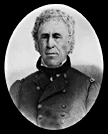 Zachary Taylor
Zachary Taylor
- Harriet Tubman: Underground Railway leader.
Harried Tubman, along with her two brothers, escape from the Poplar Neck Plantation in Maryland where she has been kept as a slave. Working as part of the Underground Railroad network, she becomes a leading abolitionist who helps hundreds of slaves to find freedom.
America: A New Nation
By the half-point of the 19th century, the United States has in place many of the building blocks needed to become a powerful nation. It has established a capital and effective governmental base in Washington, DC.
It has seen off external challenges from Mexico and the United Kingdom to vastly expand its territories, mainly through deals and diplomacy. The problems that lie ahead are mostly internal with the divides growing over attitudes towards slavery. You can follow all the major events and actions in this timeline charting America from 1850 to 1899.







